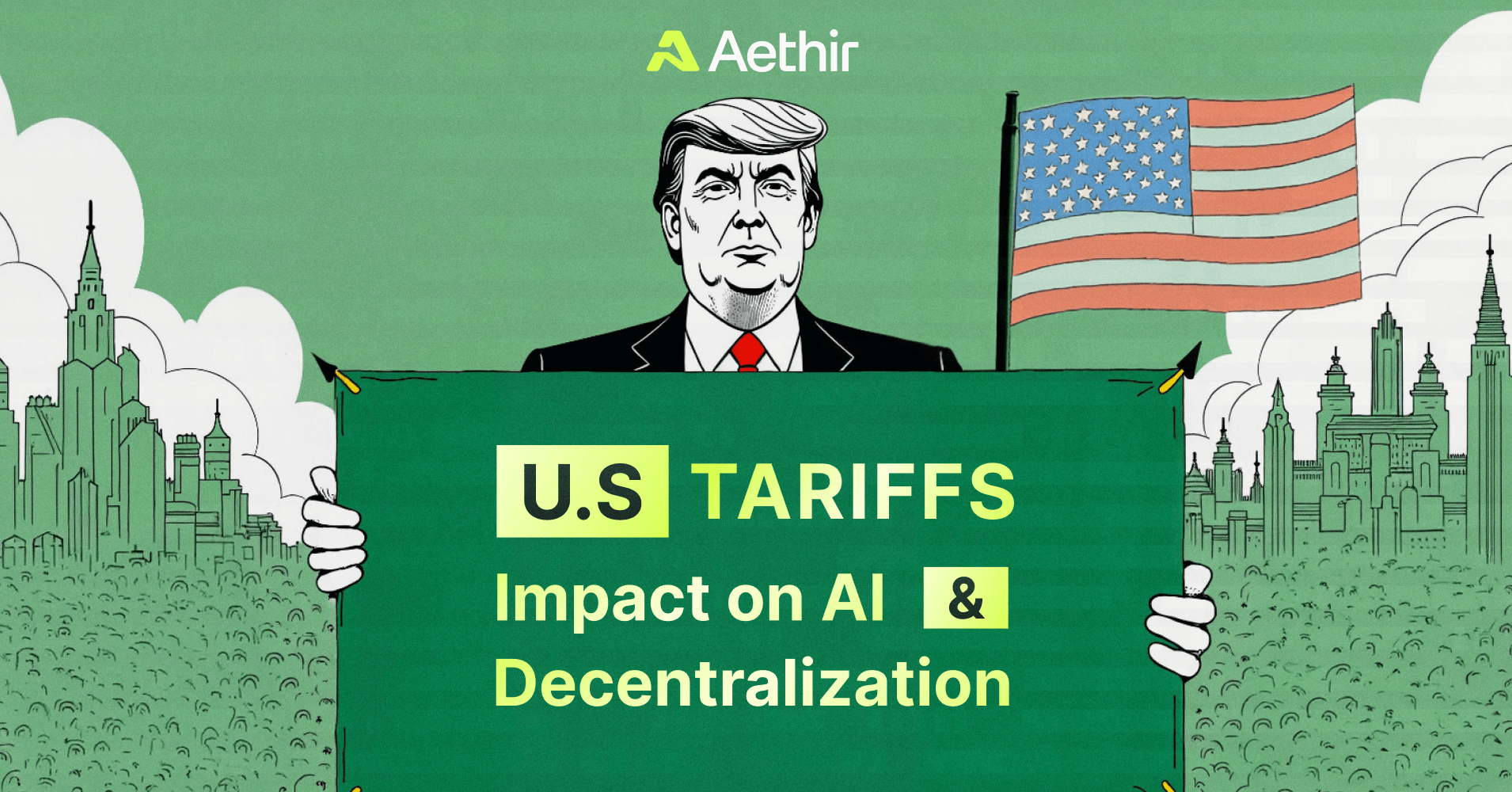In early 2025, the Trump administration announced a new wave of tariffs on imports from China, Mexico, and Canada, affecting industries from automotive and agriculture to technology and AI infrastructure. While these tariffs pose significant challenges, they also create opportunities for decentralized platforms to thrive. Businesses that adapt to these changes can leverage decentralized physical infrastructure networks (DePIN) to stay competitive by accessing cost-effective, scalable compute resources without the delays and costs tied to traditional supply chains.
What Are the New Tariffs and Who Do They Affect?
The newly proposed tariffs are designed to pressure major U.S. trading partners but risk disrupting industries that rely on global supply chains:
- Mexico & Canada: A 25% tariff will apply to key imports such as vehicles, auto parts, and agricultural goods like avocados and beef. Canadian energy exports, including crude oil and natural gas, face a 10% tariff. As of February 4, 2025, both Canada and Mexico have negotiated to postpone tariff implementation for 30 days.
- China: A 10% tariff targets consumer electronics, semiconductors, and other tech components crucial for AI development. Additionally, the elimination of the de minimis tariff exemption will affect low-cost imports from platforms like Temu and Shein.
These tariffs are expected to ripple through multiple industries, increasing operational costs and slowing growth, particularly in sectors dependent on high-performance computing and AI infrastructure.
How Tariffs Will Impact AI Infrastructure and the Tech Industry
The AI infrastructure sector is particularly vulnerable to these new tariffs, as AI development relies heavily on high-performance GPUs, specialized chips, and advanced computing hardware—much of which is imported from China and other tariffed regions.
- Increased Hardware Costs for AI Companies
The 10% tariff on Chinese semiconductors and electronics will drive up the prices of essential computing hardware. This could significantly raise operational costs for AI firms, especially startups and smaller companies, slowing innovation and increasing barriers to entry. - Supply Chain Disruptions in the Technology Sector
The tech industry depends on global supply chains to source components for AI servers, data centers, and storage appliances. The new tariffs, combined with existing supply chain vulnerabilities, could cause delays and further escalate costs. - Rising Data Center and Energy Costs
Traditional cloud service providers, which operate centralized data centers, will face increased costs due to tariffs on Canadian energy resources. Higher fuel and energy prices are likely to be passed down to customers, making centralized AI infrastructure more expensive.
Why DePIN and Decentralized Infrastructure Are the Solution to Tariff Challenges
While tariffs create obstacles for traditional AI infrastructure providers, decentralized physical infrastructure networks (DePIN) offer innovative solutions. DePIN platforms like Aethir enable businesses to quickly pivot to lower-cost, decentralized compute resources, bypassing traditional supply chain bottlenecks and reducing total cost of ownership (TCO).
- Rapid Access to Cost-Effective Compute Resources
DePIN enables businesses to bypass traditional supply chains, accessing enterprise-grade GPU resources on-demand. Platforms like Aethir aggregate surplus compute from enterprises, data centers, and miners, providing immediate access to a global network of high-performance GPUs without the delays tied to hardware imports. - Supply Chain Independence and Scalability
With decentralized GPU networks, companies are no longer tethered to specific hardware suppliers or centralized data centers vulnerable to geopolitical disruptions. Aethir, for example, offers globally distributed GPU access across 20+ locations, with deployment lead times as fast as 2 weeks—allowing businesses to scale without waiting on delayed shipments or navigating tariffed imports. - Cost Savings Through DeFi Incentives and Community Rewards
DePIN ecosystems not only reduce costs by optimizing resource utilization but also offer DeFi-based incentives. Aethir’s ecosystem rewards user and developer engagement, lowering costs and improving performance. This decentralized reward structure helps companies cut costs by up to 80% compared to traditional GPU providers, significantly reducing TCO. - Bare-Metal Performance Without Virtualization Overhead
Unlike traditional cloud services that suffer from performance degradation due to virtualization, DePIN platforms like Aethir provide bare-metal compute power. This ensures maximum resource efficiency and performance—crucial for AI workloads where computational speed and precision are non-negotiable.
Conclusion: How Businesses Can Thrive Despite Tariffs
The Trump administration’s new tariffs present significant challenges for the AI infrastructure and technology sectors, but they also open the door for transformative opportunities. Decentralized infrastructure solutions like DePIN offer businesses the flexibility to sidestep rising costs, mitigate supply chain vulnerabilities, and access high-performance compute resources on-demand.As the global economy continues to shift, businesses that embrace decentralized infrastructure will be better positioned to thrive. In this evolving landscape, platforms like Aethir represent the future of scalable, resilient, and cost-effective AI operations.
Key Takeaways
- New U.S. tariffs on China, Mexico, and Canada will impact multiple industries, especially AI infrastructure and technology.
- AI companies will face higher hardware costs, supply chain disruptions, and increased energy expenses.
- DePIN solutions offer businesses rapid, cost-effective access to decentralized compute resources, bypassing traditional supply chain hurdles.
- Incentives from DePIN ecosystems, like those offered by Aethir, lower total cost of ownership, providing a competitive edge over centralized providers.



.jpg)


_Blog_1910x1000_V3.jpg)